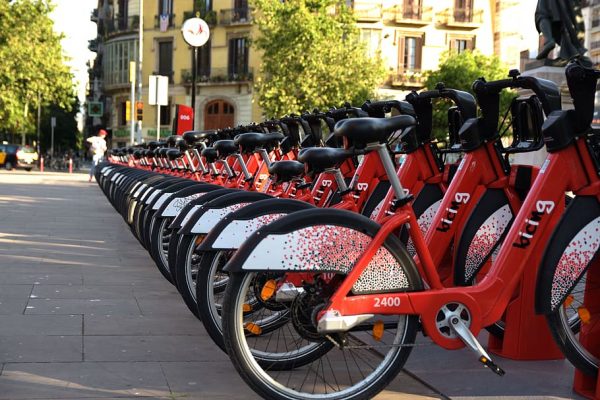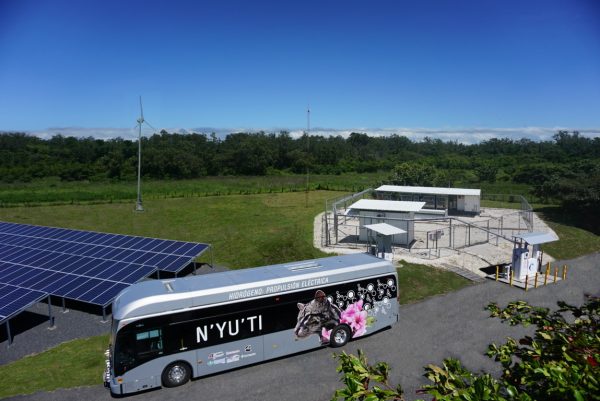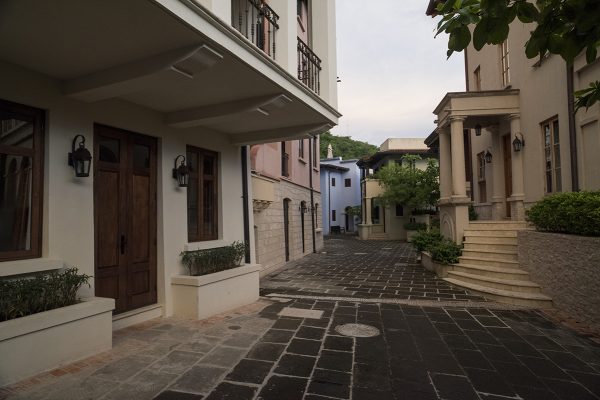Tuesday, December 24th, 2019.
In this Daily: The Forefront of Sustainable Transport in Costa Rica
There are many ways that the push away from fossil-fuel powered transport and towards more sustainable mobility is making progress around the world, focusing primarily on making technology of transport more renewable.
There has been a significant increase in the availability of electric-powered and hydrogen-fueled cars for consumer use, like the Tesla line and the Toyota Mirai. Consumer applications have also allowed consumers to use existing transport in new ways to reduce their footprint on the environment, like widely used ride sharing, bike sharing, and shared scooters, as well as newer forms like multi-transport passes.
 A bike sharing hub checkpoint in Barcelona, one of many cities that are beginning to adopt alternate forms of more sustainable transportation | PC: Commons
A bike sharing hub checkpoint in Barcelona, one of many cities that are beginning to adopt alternate forms of more sustainable transportation | PC: Commons
Costa Rica is one of the leaders of a push for sustainability in Central America, building off of successes in sustainable electric power and protection of the environment to tackle carbon-neutral and renewable mobility. Within the country, leaders like Ad Astra Rocket Company are pioneering technological advancements, and there has also been a rise of alternative ways to promote sustainable movement, like the town planning in Las Catalinas.
Sustainable Transport in Costa Rica
Costa Rica is among world leaders for a sustainable grid, and is next focusing on making strides for sustainable mobility, placing major investment in the industry thanks to its decarbonization 2050 plan.
One of these organizations is Ad Astra Rocket, an international aerospace company founded by Costa Rican astronaut Franklin Chang Diaz, who are working with emobility (electric mobility) on two frontiers. In their Houston based lab, they are at the forefront of plasma propulsion development for space travel, eyeing a future of space travel that provides a long-term solution requiring less propellant to move about in space.
Second, Ad Astra’s Ad Astra Servicios Energéticos y Ambientales (AASEA) are working on terrestrial emobility, using Guanacaste as an example of how to build an entirely sustainable hydrogen ecosystem.
 Ad Astra's sustainable mobility ecosystem is headquartered in Liberia, Guanacaste. Throughout the region, their projects include more effective energy collection, plants to capture hydrogen fuel, and hydrogen powered vehicles like the "N'yu'ti" bus
Ad Astra's sustainable mobility ecosystem is headquartered in Liberia, Guanacaste. Throughout the region, their projects include more effective energy collection, plants to capture hydrogen fuel, and hydrogen powered vehicles like the "N'yu'ti" bus
AASEA is working on three initiatives simultaneously. The company is helping develop more effective solar panels and wind turbines to collect sustainable electricity. AASEA is also constructing hydrogen collection plants that store renewable energy as hydrogen. Finally, the company has a long term goal to implement hydrogen fueling stations around Guanacaste to make hydrogen powered cars and busses feasible for widespread consumer use. This goal can already be seen in action through hydrogen busses like the Nyuti, or in cars like the Mirai, which can be found in the town of Las Catalinas.
Las Catalinas as a Hub for Sustainable Transport
There are many advancements being made to take existing forms of transport and make them more sustainable. Las Catalinas is taking a different perspective, and challenging the ways that towns are built to create a place with high urban density and walkability, where the preferred methods are walking, biking, paddling, and swimming, and there’s little need for powered transport during daily life.
 Town's walkability and bikeable streets, combined with a high urban density, encourage human-powered transportation
Town's walkability and bikeable streets, combined with a high urban density, encourage human-powered transportation
As town continues to grow, the ability to walk and bike throughout remains, such that human-powered mobility will always be the preferred form of transport in the town. Rather than finding more effective ways to transport people across long distances, the town simply brings people closer together.
To answer the need for longer distance travel, Las Catalinas has worked with Ad Astra to bring the hydrogen powered Mirai into use as a car-sharing service for those in town, which is the first consumer use of the vehicle in Central America.
By combining a town planning strategy that removes the need for powered transport with the technology to travel long distances powered by water, Las Catalinas and Ad Astra present one model for how human-centered, sustainable development can be done in the tropics.
[maxbutton id="1" url="https://cta-redirect.hubspot.com/cta/redirect/4917861/bb90976c-fd33-457a-a285-892e384bad66" text="Travel Sustainably in Las Catalinas" ]
Note for the holidays: Many guests coming to town have embraced these alternative methods of transport, arriving in Las Catalinas through wind surfing, sailboat, and even one visitor who we’ve been told will be arriving via the air sometime late this evening or tomorrow morning.